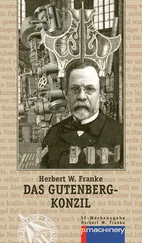“I beg to differ.”
“Beg all you like.” Fust’s eyes went steely. “It will not change the truth — or your own duty.”
His duty, then. It was his duty to trail Fust, like a hound, beyond St. Martin’s to the square they called the Leichhof, where the painters and the binders had their workshops. Peter’s duty, to feign courtesy at meeting this Klaus Pinzler, to marvel at his altarpieces and his scenes of noble revels painted on wood and glass. His duty, to wait as the fellow scraped and bowed and Peter gave a nod to show his brush would do. His duty and his torture to sit beside the men as they agreed on the contract, and to greet the wife and daughter as they sidled in and grinned. He watched his father ooze that bonhomie that greased the salesman’s path in life, and told himself that he would take the other way. He was Fust’s son, but not his slave. He stood as soon as it was seemly and made his excuses. The family rose as well; the daughter moved to open the low door. He noticed that her fingertips were blue, tipped still with the bright paint of some Madonna. He had a sudden, fleeting urge to wrap his hands around the slender throat; how like a beast a cornered man becomes. The hands he hid inside his cloak were hardened — almost deadened now. He would not stoop to show his father how that master had scarred him. The girl looked after him, pale, almond-eyed, without a trace of interest or pity. The last thing that he saw before he turned were three small blue-tipped fingers, disappearing as she slammed the door.
CHAPTER 4: SPONHEIM ABBEY
September 1485
MY DOUBTS were more than justified.”
The abbot, busy writing, startles at the printer’s dry, sardonic tone. “What do you mean?” Trithemius lifts his head, and then his nib, his left hand cupped beneath.
“You know yourself,” says Peter Schoeffer, “how little was achieved.”
The world is flooded now with crude words crudely wrought, an overwhelming glut of pages pouring from the scores of presses springing up like mushrooms after rain. Churning out their smut and prophecy, the rantings of the anarchists and antichrists — the scholars of the classics are in uproar at how printing has defiled the book.
“Not all is worthless, surely,” the young monk protests.
Peter turns his face away. “Not all, but much,” he says.
He feared it from the moment he set foot in that foul workshop — that this art hailed as sacred would instead prove a dark art. How glorious it might have been! How tawdry it was now, a vehicle for man’s base lust for fame and greed. The printer watches with a certain pity as the abbot tries to hide his shock. This is not the proud recounting that Trithemius expected.
“You would go back, then, to the days of scribes?” The abbot bends toward him, his face intent. “My monks here copy scripture for six hours a day, when they are not at chapel or at work. I’m still convinced it is the only way to truly learn the sacred texts, and practice pious discipline and self-denial.
“Communion with the Word of God, engraved indelibly on heart and mind — this is what I tell them.” His eyes are wide. “The press, for all its magic, has removed that vital link.”
“Nor did it bring the liberation that it promised.” Peter holds his eyes a moment, and then smiles. “Still, no one has yet found a way to put a genie back into a bottle.”
All these years later, Mainz is more a vassal than before. The products of her presses are all censored and the workers’ rights curtailed. The dream was gone: that with those metal letters they might lift up man from bigotry and want and greed, and raise him page by page toward heaven’s peace and plenty.
“The press is used for lucre now, and that I lay at Gutenberg’s own feet.”
“How so?”
“He was the first to turn the art to commerce. He cheapened it; he would print anything so long as someone paid him.”
“Anything?” The abbot gives him a strange look.
“Pamphlets, screeds, decrees, whatever raised a fee.”
“And you do not?” Trithemius controls his voice, but Peter hears the edge.
“All are corrupted.” He hears himself too then: the weary, jaded voice of one who’d hoped for more. “I no less than all the rest.”
He should have stayed a scribe, he sometimes thinks; at least that way he would not feel this disappointed. He has his printing works, two of his four sons who have followed him as printers; he has made hundreds of fine books. He’s richer, more upstanding, than the master ever was. But part of him still mourns that touch, the feeling of such closeness to the Lord’s creation. At night sometimes, he’ll reach for his old pouch of quills, and stroke the skin of God’s lamb with the feather of His fowl, praying for some sign.
November 1450
PETER WAS ENSLAVED by duty, and it chafed. If Fust would not release him, he might spend his life in filth and smoke, his spirit shriveling like twigs thrown on the fire. His only hope was to secure a new position that would both set him free and allow his father to save face. He’d thought first that Jakob might help: there wasn’t anyone who loathed the Elders more, and Gutenberg was nothing if not an arrogant, abusive Elder. But then Peter saw himself, cap in hand, groveling before his uncle for some kind of clerkship. Mainz is bankrupt, dunce, Jakob would say. What scraps remain should go to those who pulled their weight. Not that Peter aimed to stay in Mainz; the place was heavy with the venom of that internecine war. For the first time in his life, he thought of purposefully failing — of doing work so foul and torturously slow that Gutenberg would have to cut him loose. He could not bring himself to do it. He had his pride, and pride did have its uses: mixed well with bitterness, it hardened in the backbone. There had to be someone he knew, some former teacher or a fellow who could get him a scribe’s post inside a chancellery, with luck a distant bishop’s or a duke’s.
His suit was buried in a chest beneath the bed: a short dark cloak, a cap pierced by a raven’s plume, a high-collared long white shirt and leggings, and the chamois pouch in which he kept his writing tools. As he unfolded them, he could feel that inky world receding. It seemed a dream, his old Parisian life. Who did she flirt with now, Céline with her russet curls? What did his former fellows say about his sudden disappearance as they gossiped in the morning at their lecterns?
He pulled his old skin on and slipped out after dark one evening from the Haus zur Rosau. The moon was low on the horizon, and the lanes that led to the cathedral were black tunnels, houses clawing toward each other overhead. The market square split open in a sudden pool of light. There was a mist about: November had its foot wedged in the door. Soon it would be the feast day of Saint Martin, the city’s patron saint. What chance was there they’d act the play this year upon the broad cathedral stair? Jakob would scream bloody murder if they tried. The people would not stand for such hypocrisy, he’d rail: the rich man tearing off his cloak and rending it in two to share with some poor lad dressed up to play the beggar.
Peter’s destination was the Schreibhaus at the corner of the painters’ district — the Writing House, belonging to the monks who dwelt outside the city wall at St. Viktor’s. In those days the scriptoria were in full flower all across the empire; in Mainz the finest books were written at the Charterhouse of the Carthusians or at the hilltop monastery of the Augustines of St. Viktor’s. The order’s house inside the wall had served for decades as their city school, and hostel for the lay scribes that they sometimes hired. In recent years he’d heard that it had turned into a meetinghouse for clergy of all kinds, although some scribes still worked in a back room.
Читать дальше












